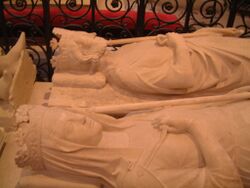768
► | قرن 7 | << قرن 8 >> | قرن 9 | ◄
► | عقد 730 | عقد 740 | عقد 750 | << عقد 760 >> | عقد 770 | عقد 780 | عقد 790 | ◄
► | ► | 763 | 764 | 765 | 766 | 767 | << 768 >> | 769 | 770 | 771 | 772 | 773 | ◄ | ◄
تحويل 1-1-768م الى هجري (وصلة خارجية) | تحويل 31-12-768م الى هجري (وصلة خارجية) | ابحث في الموسوعة عن مواضيع متعلقة بسنة 768
| الألفية: | الألفية 1 |
|---|---|
| القرون: | القرن 7 - القرن 8 - القرن 9 |
| العقود: | عقد 730 عقد 740 عقد 750 - عقد 760 - عقد 770 عقد 780 عقد 790 |
| السنوات: | 765 766 767 - 768 - 769 770 771 |
| 768 حسب الموضوع | |
| السياسة | |
| زعماء الدول – الدول ذات السيادة | |
| تصنيفات المواليد والوفيات | |
| المواليد – الوفيات | |
| تصنيفات التأسيسات والانحلالات | |
| تأسيسات – انحلالات | |
| التقويم الگريگوري | 768 DCCLXVIII |
| آب أوربه كونديتا | 1521 |
| التقويم الأرمني | 217 ԹՎ ՄԺԷ |
| التقويم الآشوري | 5518 |
| التقويم البهائي | −1076 – −1075 |
| التقويم البنغالي | 175 |
| التقويم الأمازيغي | 1718 |
| سنة العهد الإنگليزي | N/A |
| التقويم البوذي | 1312 |
| التقويم البورمي | 130 |
| التقويم البيزنطي | 6276–6277 |
| التقويم الصيني | 丁未年 (النار الماعز) 3464 أو 3404 — إلى — 戊申年 (التراب القرد) 3465 أو 3405 |
| التقويم القبطي | 484–485 |
| التقويم الديسكوردي | 1934 |
| التقويم الإثيوپي | 760–761 |
| التقويم العبري | 4528–4529 |
| التقاويم الهندوسية | |
| - ڤيكرام سامڤات | 824–825 |
| - شاكا سامڤات | 690–691 |
| - كالي يوگا | 3869–3870 |
| تقويم الهولوسين | 10768 |
| تقويم الإگبو | −232 – −231 |
| التقويم الإيراني | 146–147 |
| التقويم الهجري | 150–151 |
| التقويم الياباني | Jingo-keiun 2 (神護景雲2年) |
| تقويم جوچى | N/A |
| التقويم اليوليوسي | 768 DCCLXVIII |
| التقويم الكوري | 3101 |
| تقويم مينگوو | 1144 قبل جمهورية الصين 民前1144年 |
| التقويم الشمسي التايلندي | 1311 |
Year 768 (DCCLXVIII) was a leap year starting on Friday (link will display the full calendar) of the Julian calendar. The denomination 768 for this year has been used since the early medieval period, when the Anno Domini calendar era became the prevalent method in Europe for naming years.
أحداث
By place
Frankish Kingdom
- September 24 – King Pepin III (the Short) dies at Saint-Denis, Neustria. The Frankish Kingdom is divided between his two sons: Charlemagne and Carloman I. According to Salic law Charlemagne receives the outer parts of the kingdom bordering on the sea, namely Neustria, western Aquitaine, and the northern parts of Austrasia; while Carloman is awarded his uncle's former share, the inner parts: southern Austrasia, Septimania, eastern Aquitaine, Burgundy, Provence, Swabia, and the lands bordering Italy.
- Waiofar, duke of Aquitaine, and his family are captured and executed by the Franks in the forest of Périgord.[1] Waiofar's kinsman Hunald II succeeds to his claims and continues to fight against Charlemagne.[2]
Iberian Peninsula
- Fruela I (the Cruel), the King of Asturias, is assassinated in Cangas, his capital, after he murders his brother Vimerano. Fruela is succeeded by his cousin Aurelius, who is chosen by the nobility.
- In al-Andalus, the Berber tribal chieftain Saqiya ibn Abd al Wahid al-Miknasi leads a rebellion against the Emirate of Córdoba, in the present-day Spanish province of Extremadura.[3]
Britain
- King Alhred of Northumbria marries Princess Osgifu, possibly daughter of the late king Oswulf (approximate date).
Asia
- The Kasuga Shrine is erected at Nara (Japan), by the Fujiwara family. The interior is famous for its many bronze lanterns, as well as the stone lanterns that lead up to the Shinto shrine
By topic
Religion
 Pope Stephen III (768–772) |
- August 7 – Pope Stephen III succeeds Paul I as the 94th pope of the Catholic Church. The antipope Constantine II is overthrown at Rome, through intervention by King Desiderius of the Lombards, after a brief reign (see 767).
- Lebuinus, Anglo-Saxon missionary, founds the city of Deventer (modern-day Netherlands), and builds a wooden church on the bank of the River IJssel (approximate date).
- Archbishop Elfodd of Gwynedd persuades the Welsh Church to accept the Roman dating of Easter, as agreed by the British Church at the Synod of Whitby (see 664).
مواليد
- Han Yu, Chinese philosopher and poet (d. 824)
- Konstanti Kakhi, Georgian nobleman (d. 853)
- Song Ruoxin, Chinese scholar, poet and lady-in-waiting (d. 820)
- Xue Tao, Chinese poet (d. 831)
وفيات
- August 20 – Eadberht، ملك نورثمبريا
- September 24 – Pepin the Short, king of the Franks (b. 714)
- Dub-Indrecht mac Cathail, king of Connacht (Ireland)
- Fruela I, king of Asturias
- Li Huaixian, general of the Tang Dynasty
- Pagan, ruler (khagan) of the Bulgarian Empire
- Toto, duke of Nepi
- Waiofar, duke of Aquitaine
- Winibald, Anglo-Saxon abbot
- Yaxun B'alam IV, ruler (ajaw) of Yaxchilan (b. 709)
References
- ^ Lewis, Archibald Ross (1965). The Development of Southern French and Catalan Society, 718–1050. Austin: University of Texas Press. pp. 27–28.
- ^ Bachrach, Bernard (1974). "Military Organization in Aquitaine under the Early Carolingians". Speculum. 49 (1): 13. doi:10.2307/2856549. JSTOR 2856549. S2CID 162218193.
- ^ Joel Serrão and A. H. de Oliverira Marques (1993). "O Portugal Islâmico". In Joel Serrão and A. H. de Oliverira Marques (ed.). Hova Historia de Portugal. Portugal das Invasões Germânicas à Reconquista. Lisbon: Editorial Presença. p. 124.
